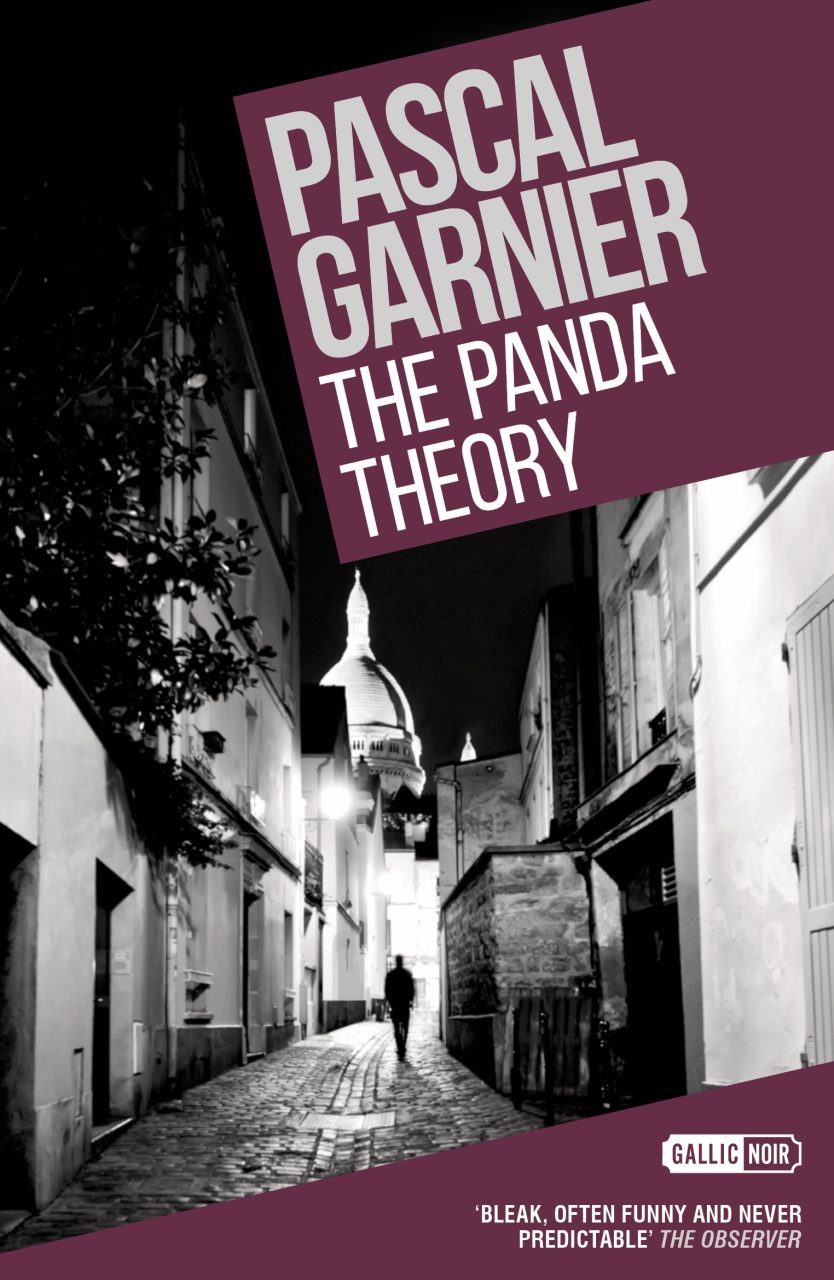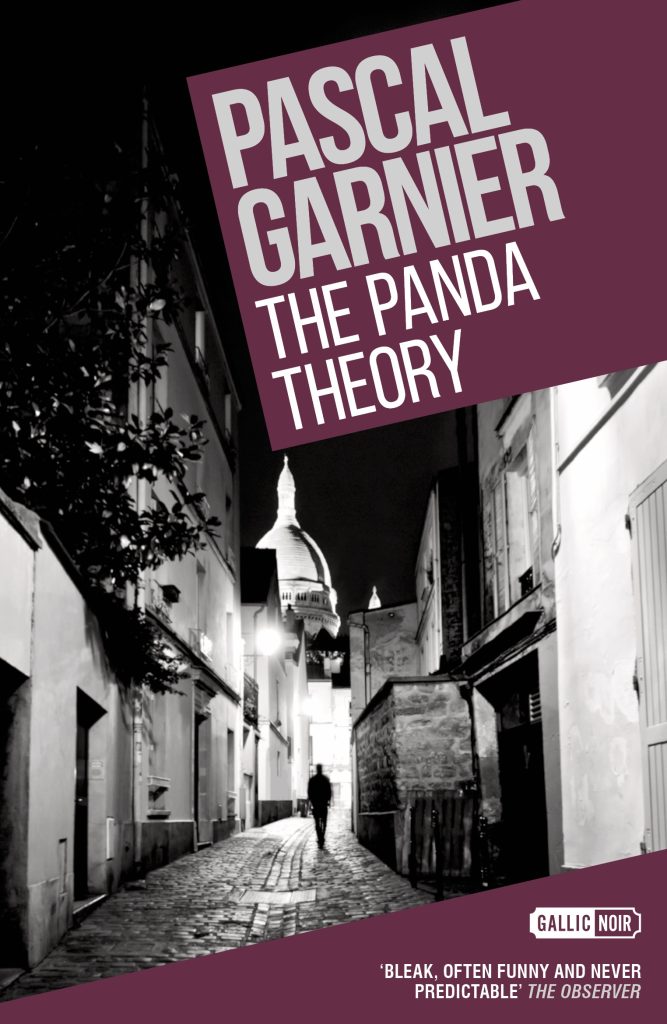
The milieus are open [in the/to] chaos which threatens them with exhaustion or intrusion.
Deleuze and Guattari
Intrusion – a recurring concept which haunts and tempts me at the same time. My simultaneous nemesis and salvation. My imperishable confirmation and, synchronously, the unscrupulous pitfall within which I ensnare myself all too often. I had to put my 6-part farewell review on hold due to its unfathomable and unpredictable machinations. Yet, somehow miraculously – miraculously as if I had once again gone back in time to unintentionally exploit my past serendipity towards literature which moves and dances – I have put my hands on a novel which not only grants you insight into how different and multifaceted nothingness of the 21st Century appears to be, but also shows the other concept mentioned in the opening quote – exhaustion. And its puckishly splendorous consequences.
The Panda Theory by Pascal Garnier, is one of these novels which you can only read once, just like Iain Reid’s I’m thinking of ending things, yet it perches on the opposite side of the concept-inducing spectrum. So closely does the Frenchman’s novel resemble a beautiful inevitability of not being able to resist a new dimension of meaninglessness associated with life itself, it takes a courageous mind not to crumble under its sentences. ‘Courageous’ here meaning being able to withstand the stares, with which uncharted types of abysses – ‘granddaughters’ and ‘grandsons’ of Nietzschean Abyss – so gladly and eagerly x-ray us each and every day. Provided the novel ‘accepts’ you. Contrary to the Canadian’s book which retains the accessibility of a mystery novel, The Panda Theory, with its post-existential vibe, is highly exclusionary. How so? It’s time to meet our Protagonist.
It’s fairly safe to assume, the only precise method of defining things is by way of showing. Pointing your grubby finger, your not-so-square chin, your presupposedly round head. Not only is this ostensive brazenness required to demonstrate who Gabriel – The Panda Theory protagonist – is, but there simply is no other way to depict what remains of everything a human being constitutes after nothingness has overthrown it all. That’s why I would like you to imagine my words are fingers, chins and heads. At least, until the following paragraph ends.
Gabriel appears in a small Breton town where the devil says goodnight. At first, he seems like a regular type of guy, although a bit introverted one. He knows how to get by and has some money. What he has more, though, is a somewhat penetrative ability to get into the orbit of other people’s lives. Yet, this penetrative passiveness of his – that’s what my crooked finger would point at – somehow escapes the clear definition. As if it were peppered with something unnamable which enriches it with frank dejection, a bold, stout, self-evident refusal to become fully attached to something and/or someone. Or to anything and everyone in general. A presence without being, an unfounded appearance, a banshee of the state-of-the-art Nothingness, Gabriel is an intrusion, a ‘grandson’ of Nietzschean Abyss, whose eyes neither reject nor approve, neither judge nor do they cut anybody any slack. He is an active man – he wanders around the town, talks to people, befriends them and – first and foremost – cooks for them. Just like any other open-hearted fellow would do. However, there is something irrevocable about him, something which separates him from everything and everyone, existentially, almost metaphysically. As if he were molded from a different type of clay, a more exhausted one. From the second, also pretty intrusive, narrative we get to know why is that so, and suddenly the slow-paced yet lucid goings-on accelerate through the build-up and twist phase… and we are struck by sensations which escape well-trodden paths of description.
What strikes the most in The Panda Theory, though, is the straightforward delicacy of language. I like to call it “The French Subtlety”. Name-wise, a slightly questionable trait, especially for authors of different nationalities who also possess it, nevertheless, it fits like a glove. Garnier himself oftentimes claimed that he kept his narratives plain and simple due to his insufficient education. A gross exaggeration bordering on self-flagellation, especially when the instantly perceptible intensity of his writing style hits us like a bludgeon. The book reads smoothly, surprisingly, considering the weight it carries on its back. Garnier’s pen ‘strokes’ (apparently, the Frenchman was also a painter), distinctively calm, with unpretentiously poetic touches here and there, are as far from numbing your thoughts and making your heart yawn as a fingerless vet is from becoming an origami master. The brilliance of Garnier’s writing lies in his honesty. He is one of those authors who write not with their blood, but the blood of their spirits, blood of their hearts, blood of their souls. This “trisomy” of blood springs warrants there is no beating about the bush, every sentence is like a finely oiled cog and sprocket, fitting seamlessly into the true-to-life machinery of narrative, being only one step removed from the natural flow of events. The memorable mimetic prowess of Garnier’s prose is almost unmatched and resembles a harmonious melody of necessities. Perhaps that’s why we have no objections believing Gabriel is an intrusion, or, rather, inTRUEsion…
Juxtaposing Garnier’s main character with protagonists of David Markson’s Wittgenstein’s Mistress and Georges Perec’s A Man Asleep, we witness another type of outsider-ish alienation. It is less of a post-skeptical metaphysical somersault of Kate’s “no-other-wayness” than obtuse obfuscations experienced by the nameless hero penned in the 2nd person by the OuLiPean Prince himself, however, by way of sheer tangibility of silent disgruntlement with reality, Gabriel is on a par with them both. He retains the firmest grip on it, though. The reality exhausted him thoroughly, sucked him dry, true, thus he resorts to the last thing remaining – becoming an intrusion, turning “antiseptic” to all identifiable internal human affects and afflictions. Yet, he rides the more subordinate wave of oddity, dejectedness and inexpressibility than Markson’s and Perec’s protagonist do. He is less philosophically flamboyant and oblivious than Kate from Wittgenstein’s…, as well as less language-bound and separated from externality than Perec’s ‘sleepwalker’ is. He may be patted on the back, smiled at, talked to, yet he is absent, his internal qualities are abject, depleted, nonexistent. He is a shadow of a shell, a none – if I may transform this indefinite pronoun into a regular noun – a none which is so used to its own exhaustion, it strips him down to the bare necessity of continuing to be without everything. If every facet of reality is laced with illusions, then Gabriel has to be what he is – a dis-illusioned none, a harbinger of unassuming nothingness. A nothingness which might be approached, even high-fived, yet it remains untouched. And will carry on doing so, from the bleak beginning on a grim train station to… well, I am not going to spoil the wide grin of Panda.
Amonne Purity




